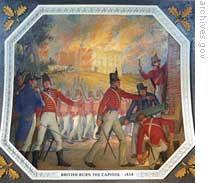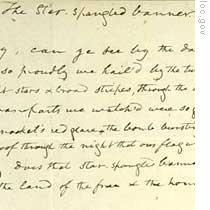VOA慢速英语-THE MAKING OF A NATION - American History Series: Br
时间:2019-01-11 作者:英语课 分类:VOA慢速英语2008年(八)月

Detail of a mural by Allyn Cox in the Capitol building. The painting shows the burning of the Capitol in 1814.
The United States declared war on Britain in eighteen twelve. It did so because Britain refused to stop seizing American ships that traded with France -- Britain's enemy in Europe.
Britain finally suspended its orders against neutral trade, after a change in government. But the British acted too late. The United States had declared war. Today, Larry West and Frank Oliver continue the story of the War of Eighteen Twelve.
(MUSIC)
VOICE ONE:
The United States navy was not ready for war. It had only a few real warships 2 and a small number of gunboats. It could not hope to defeat the British navy, the most powerful in the world. What the United States planned to do was seize Canada, the British territory to the north. Twenty-five hundred British soldiers guarded the border. And American generals believed they could win an easy victory. They were wrong.
(MUSIC)
VOICE TWO:
An American general named William Hull 3 led two thousand men across the Canadian border. British soldiers were prepared, and they forced the Americans back. The British fought so well that General Hull surrendered all his men and the city of Detroit.
The next American attack was made from Fort Niagara, a military center in New York on the shore of Lake Ontario. A small group of American soldiers crossed the Niagara River and attacked the British. Other Americans -- state soldiers of New York -- refused to cross the border to help against the British. They calmly watched as British soldiers shot down the attacking Americans.
The third campaign was made by General Henry Dearborn. He led an army of state soldiers from Plattsburgh, New York, to the Canadian border. He was to cross the border and attack Montreal. But the state soldiers again refused to cross the border. Dearborn could do nothing but march them back to Plattsburgh.
(MUSIC)
VOICE ONE:
British forces at this time were winning victories. They captured an American fort in northern Michigan. And Indians -- fighting for the British -- captured a fort at the place now known as Chicago.
Instead of marching through Canada without difficulty, the Americans found themselves trying hard to keep the British out of the state of Ohio.
VOICE TWO:

The Battle of Queenston Heights was a British victory during the War of 1812
For a while, the weak little American navy was doing better than the army.
Just two months after the war started, the United States warship 1 Constitution forced a British ship to surrender. Several months later another American ship, the Wasp 4, captured the British ship Frolic. Then the frigate 5 the United States defeated one of Britain's most famous fighting ships, the Macedonian. The British ship was captured and brought to the United States.
There were other victories at sea. At the end of six months, the United States navy had captured six British ships and lost only one of its own vessels 6.
Private American trade ships had been armed with guns when the war started. They, too, were successful against the British. They captured more than three hundred British trade ships.
The American successes forced Britain to bring more of its fighting ships into the war with the United States. By the middle of eighteen thirteen, a year after the war started, British ships controlled the United States coast. Not an American ship could enter or leave any port south of New England.
(MUSIC)
VOICE ONE:
The military situation was improving in the West. William Henry Harrison, governor of the Indiana territory, formed a large force to try to capture Detroit from the British. At the same time, Captain Oliver Perry built five warships on Lake Erie. With these and four he already had, Perry met and completely defeated an English naval 7 force.
Perry reported his victory to Harrison: "We have met the enemy, and they are ours."
Perry's victory and Harrison's large force caused the British to withdraw from Detroit, and from a British fort at Malden, in Canada. Harrison's men continued to chase the enemy. They caught them and defeated them in the battle of the Thames. Killed in this battle was the great Indian chief Tecumseh who had been fighting for the British.
United States forces made new attempts to win control of Lake Ontario and invade Canada across the Niagara River. But none of these succeeded. Late in eighteen thirteen, British soldiers crossed the river and captured Fort Niagara. They also burned the town of Buffalo 8.
(MUSIC)
VOICE TWO:
By April eighteen fourteen, Napoleon was forced from power in Europe. And the war between France and Britain was over. This permitted Britain to send many of its soldiers in Europe to fight against the United States.
Fourteen thousand troops were sent to Canada. A smaller force was put on ships that sailed along the American coast. Another group of British soldiers was sent to Jamaica to prepare for an attack on New Orleans.
The British planned to send an army of eleven thousand men down from Canada into New York. But before this, the soldiers aboard ships along the American coast were to attack the Chesapeake Bay area and threaten Washington and Baltimore.
About four thousand British soldiers landed on the Chesapeake coast, southeast of Washington. They marched quickly toward the capital. An American general, William Winder, commanded a force two times the size of the British group. Winder was not a good general, and his troops did not defend well.
VOICE ONE:

On August 24, 1814, British forces burned Washington's main government buildings
The two sides met at Bladensburg, a town ten kilometers from Washington. The British attacked and at first the American defenders 9 held their ground. But then, British soldiers broke through the American lines, and the Americans began to run away.
General Winder ordered his men back to Washington. A group of sailors refused to retreat with their artillery 10. Commanded by Joshua Barney, the four hundred sailors chose to stand and fight. The struggle did not last long against the four thousand British soldiers.
Barney held his position for a half hour before enemy soldiers got behind his men and silenced the guns. Barney was wounded seriously. The British thought so much of his courage that they carried him to a hospital for their own soldiers at Bladensburg. Barney himself said the British officers treated him as a brother.
Once the British force had smashed through Barney's navy men, nothing stood between it and Washington.
(MUSIC)
VOICE TWO:

Dolly Payne Madison
The enemy spent the night about half a kilometer from the Capitol building. The commanders of the British force, General Robert Ross and Admiral Sir George Cockburn, took a group of men to the Capitol and set fire to it. Then the two commanders went to the White House to burn it.
Before setting fire to the president's home, Cockburn took one of President Madison's hats and the seat from one of Dolley Madison's chairs. The admiral found the president's table ready for dinner. As a joke, he took a glass of wine and toasted the health of "President Jemmy."
President Madison had fled the White House earlier. He crossed the Potomac River and started toward his home in Virginia. He joined his wife on the road the second day. And they decided 11 to wait with others about twenty-five kilometers from Washington. The president returned to the capital three days after he left it. The British, after burning most public buildings, had withdrawn 12.
VOICE ONE:
The British coastal 13 force next attacked the city of Baltimore. But this time, the defenses were strong, and the attack failed.
Baltimore port was guarded by Fort McHenry. British warships sailed close to the fort and tried to destroy it with their guns. But the attack did little real damage to the fort.

''The Star-Spangled Banner'' by Francis Scott Key
A young American civilian 14, Francis Scott Key, was aboard one of the British warships during the twenty-five-hour shelling of Fort McHenry. He and a group of others had gone to the ship with a message from President Madison. The message asked the British to release an American doctor they were holding.
All through the night, the young man watched the shells bursting and the rockets exploding over the fort. In the first light of morning, he saw that the American flag still flew. On the back of an old letter from his pocket, Francis Scott Key wrote the words of "The Star-Spangled Banner," the national anthem 15 of the United States.
(MUSIC)
ANNOUNCER:
Our program was written by Frank Beardsley. The narrators were Larry West and Frank Oliver. Transcripts 16, MP3s and podcasts of our programs are online, along with historical images, at voaspecialenglish.com. Join us each week for THE MAKING OF A NATION – an American history series in VOA Special English.
__
This is program #46 of THE MAKING OF A NATION
- He is serving on a warship in the Pacific.他在太平洋海域的一艘军舰上服役。
- The warship was making towards the pier.军舰正驶向码头。
- The enemy warships were disengaged from the battle after suffering heavy casualties. 在遭受惨重伤亡后,敌舰退出了海战。
- The government fitted out warships and sailors for them. 政府给他们配备了战舰和水手。
- The outer surface of ship's hull is very hard.船体的外表面非常坚硬。
- The boat's hull has been staved in by the tremendous seas.小船壳让巨浪打穿了。
- A wasp stung me on the arm.黄蜂蜇了我的手臂。
- Through the glass we can see the wasp.透过玻璃我们可以看到黄蜂。
- An enemy frigate bore down on the sloop.一艘敌驱逐舰向这只护航舰逼过来。
- I declare we could fight frigate.我敢说我们简直可以和一艘战舰交战。
- The river is navigable by vessels of up to 90 tons. 90 吨以下的船只可以从这条河通过。 来自《简明英汉词典》
- All modern vessels of any size are fitted with radar installations. 所有现代化船只都有雷达装置。 来自《现代汉英综合大词典》
- He took part in a great naval battle.他参加了一次大海战。
- The harbour is an important naval base.该港是一个重要的海军基地。
- Asian buffalo isn't as wild as that of America's. 亚洲水牛比美洲水牛温顺些。
- The boots are made of buffalo hide. 这双靴子是由水牛皮制成的。
- The defenders were outnumbered and had to give in. 抵抗者寡不敌众,只能投降。 来自《简明英汉词典》
- After hard fighting,the defenders were still masters of the city. 守军经过奋战仍然控制着城市。 来自《简明英汉词典》
- This is a heavy artillery piece.这是一门重炮。
- The artillery has more firepower than the infantry.炮兵火力比步兵大。
- This gave them a decided advantage over their opponents.这使他们比对手具有明显的优势。
- There is a decided difference between British and Chinese way of greeting.英国人和中国人打招呼的方式有很明显的区别。
- Our force has been withdrawn from the danger area.我们的军队已从危险地区撤出。
- All foreign troops should be withdrawn to their own countries.一切外国军队都应撤回本国去。
- The ocean waves are slowly eating away the coastal rocks.大海的波浪慢慢地侵蚀着岸边的岩石。
- This country will fortify the coastal areas.该国将加强沿海地区的防御。
- There is no reliable information about civilian casualties.关于平民的伤亡还没有确凿的信息。
- He resigned his commission to take up a civilian job.他辞去军职而从事平民工作。
- All those present were standing solemnly when the national anthem was played.奏国歌时全场肃立。
- As he stood on the winner's rostrum,he sang the words of the national anthem.他站在冠军领奖台上,唱起了国歌。
- Like mRNA, both tRNA and rRNA are transcripts of chromosomal DNA. tRNA及rRNA同mRNA一样,都是染色体DNA的转录产物。 来自辞典例句
- You can't take the transfer students'exam without your transcripts. 没有成绩证明书,你就不能参加转学考试。 来自辞典例句